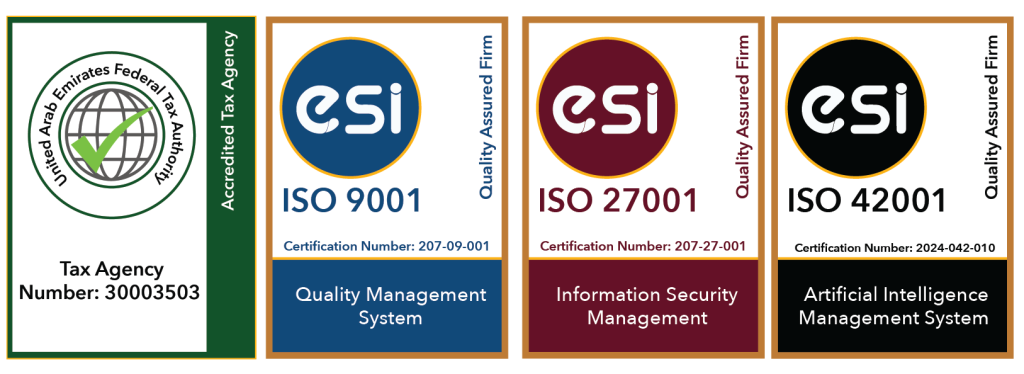The UAE Corporate Tax (CT) regime, established under Federal Decree-Law No. 47 of 2022, has introduced new compliance obligations for UAE businesses. For many entities filing for the first time under the new regime, full understanding of a complex tax law can be challenging leading to common issues including missed reliefs, incorrect classifications and documentation gaps. Such issues can increase tax payable and raise the likelihood of adjustments or enquiries from the Federal Tax Authority (FTA).
A Corporate Tax Return Health Check can be a valuable exercise under a professional review of the return, supporting records and elections to confirm filing accuracy. The approach can identify missed reliefs that could reduce tax payable and detect compliance weaknesses that may attract FTA attention.
Why a Corporate Tax Health Check Matters
The UAE CT framework applies to businesses with taxable income above AED 375,000 and sets a standard rate of 9% (with specific reliefs available in defined circumstances). Common reliefs and exemptions include:
- Small Business Relief — for businesses with revenue up to AED 3 million (available until 2026).
- Qualifying Free Zone Person (QFZP) — potential 0% rate for qualifying income subject to substance and qualifying income requirements.
- Group Relief and Business Restructuring Relief — intra-group arrangements meet ing FTA conditions.
These reliefs require correct elections, documentary support and ongoing compliance. Failure to apply them correctly can lead to overpayment and create audit exposure. Penalties for non-compliance (for example late registration) can start at AED 10,000. The filing procedure requires minimal supporting documentation and declarations which may be subject to a more in-depth assessment of eligibility. Hence, a secondary review assists in strengthening the case for any tax position.
Key Best Practices for FY24 CT Return Health Check
1. Confirm CT Registration and Taxpayer Profile Information
- Verify registration on EmaraTax and confirm a valid Tax Registration Number (TRN).
- Check registration timing against license or incorporation dates to avoid late registration penalties.
2. Reconcile Financial Statements to the Tax Return
- Prepare IFRS-compliant financial statements and reconcile key accounting lines to tax computations.
- Confirm correct classification of income, expenses and permanent/temporary differences.
- Retain underlying records for at least seven years to meet FTA requirements.
3. Assess Eligibility for Reliefs and Elections
- Re-evaluate eligibility for Small Business Relief, QFZP status and Group Relief.
- Confirm substance, qualifying income and any transactional limits for Free Zone regimes.
- Review irrevocable elections (for example, realisation basis or foreign permanent establishment claims) and ensure they were correctly applied in the first return.
4. Validate Transfer Pricing and Related-Party Transactions
- Ensure related-party transactions reflect OECD arm’s-length principles.
- Prepare and maintain transfer pricing documentation and master/local files where applicable.
- Test critical intercompany pricing and service charge allocations for consistency with documentation.
5. Review Tax Adjustments and Disclosures
- Verify that tax adjustments (non-deductible expenses, disallowances, incentives) match accounting records and policy.
- Confirm that required schedules and disclosures were completed in EmaraTax (auditor details, Free Zone schedules, etc.).
- Recheck treatment of cross-border items
6. Prepare for EmaraTax Filing and Audit Readiness
- Complete interactive CT return inputs and attach mandatory documents (financial statements, auditor confirmation where applicable).
- Document the rationale for relief claims and retain evidence that supports qualifying conditions.
Common Mistakes That Lead to Higher-than-Expected CT
The Corporate Tax Law provides for a number of opportunities that optimise any tax position. Unless there os a defined understanding of each legal and compliance parameter, your business may have missed one or more of the below:
- Failure to claim eligible reliefs (Small Business Relief, QFZP or Group Relief).
- Incorrect classification of income streams or expenses.
- Missing or incomplete transfer pricing documentation.
- Applying irrevocable elections incorrectly in the first return.
- Inadequate supporting documentation for exemptions or deductions.
Action Plan for Businesses
Our Corporate Tax Health Check approach seeks to determine the veracity and robustness of your first return to instil confidence and a strategy for future tax periods by:
- Conducting a focused gap analysis between the filed return and supporting records.
- Implement corrective tax computations and consider voluntary disclosures where adjustments reduce tax or remove exposure.
- Strengthen internal controls: accounting cut-offs, transaction coding and approval workflows.
- Advice for complex areas such as Free Zone qualification, group relief or transfer pricing documentation.
Hence it may be a viable exercise to schedule a Corporate Tax Return Health Check before finalising the filing to identify recoverable reliefs and surface audit risks.
Conclusion
A structured FY24 Corporate Tax Return Health Check helps organisations confirm filing accuracy, identify missed reliefs and address compliance weaknesses that could lead to FTA adjustments. Early review of registrations, elections, transfer pricing and supporting documentation can reduce tax payable and improve audit readiness. Companies that discovered a higher-than-expected CT charge benefit from an immediate review to determine whether additional reliefs apply or whether unidentified risks require remediation.
About SimplySolved
As a UAE FTA-approved Tax Agency and ISO 9001, 27001, and 42001 certified organization, SimplySolved delivers comprehensive corporate tax and compliance solutions tailored to business requirements. Our services include Corporate Tax registration, return preparation, tax health checks, transfer pricing compliance, and advisory support, ensuring full alignment with UAE regulations and international standards.
Backed by a team of experienced consultants, we help businesses optimize tax positions, maintain accurate documentation, and mitigate FTA audit risks. Our structured approach combines practical guidance with robust processes, enabling organizations to focus on core operations while ensuring compliance across all corporate tax obligations.
We serve 100’s of clients acting to implement reliable, cost-effective, and transparent solutions that simplify complex tax requirements and deliver confidence in compliance.





